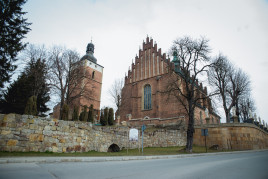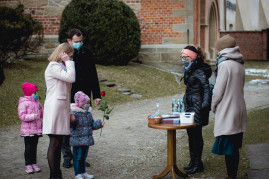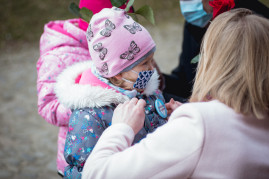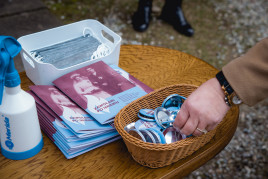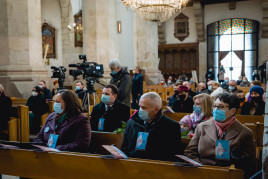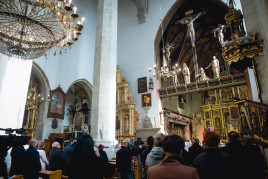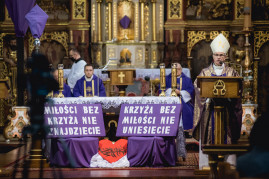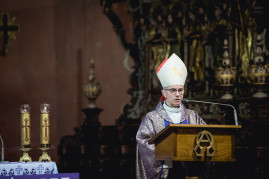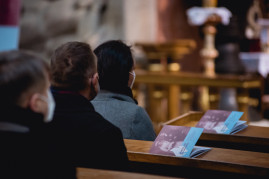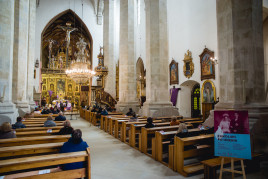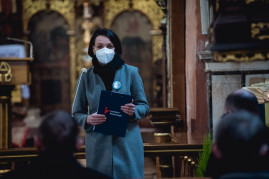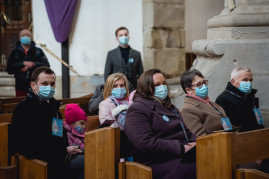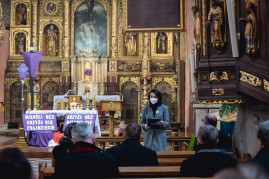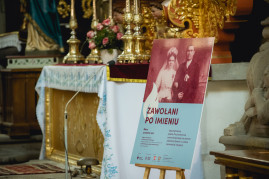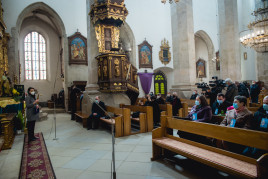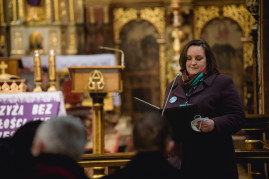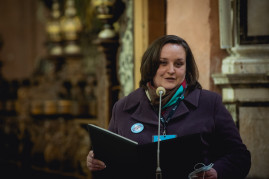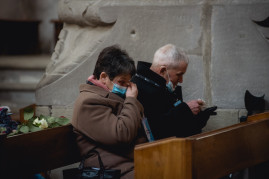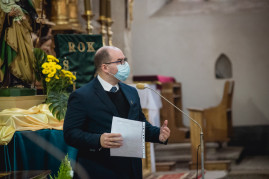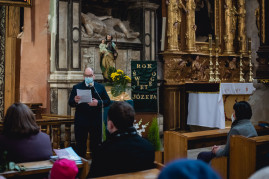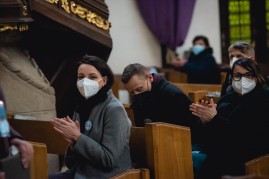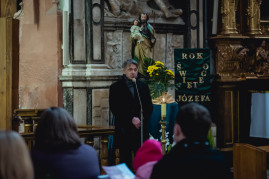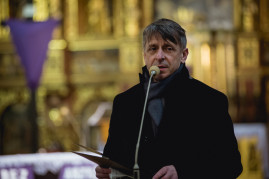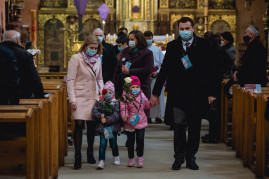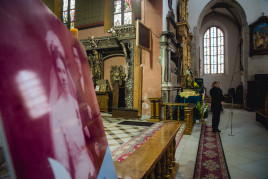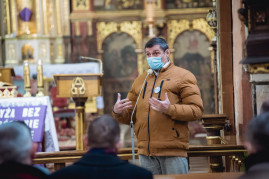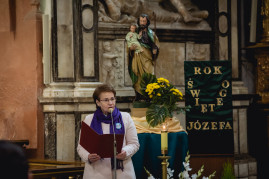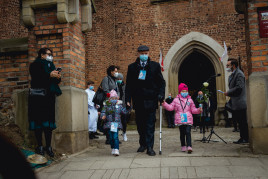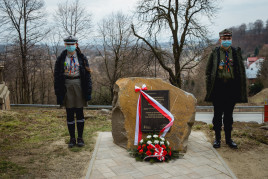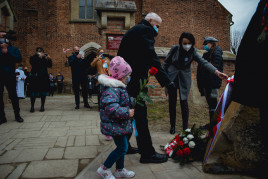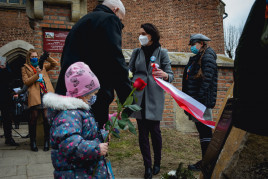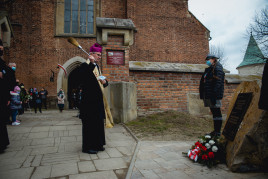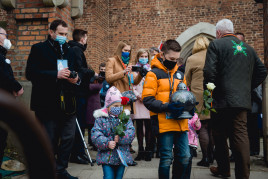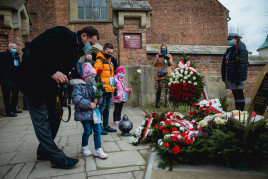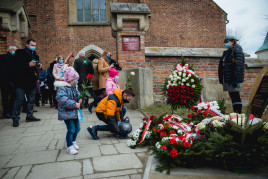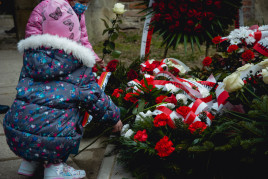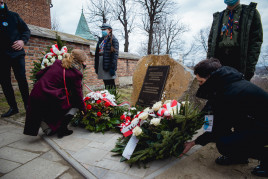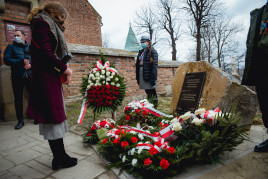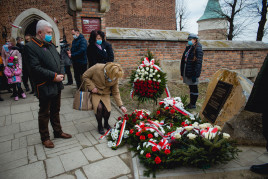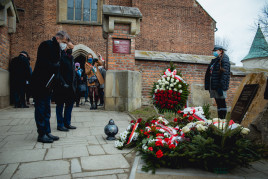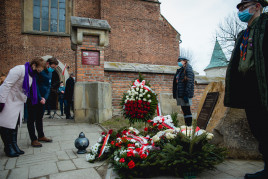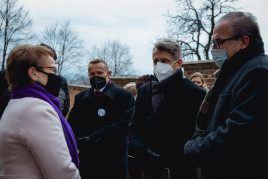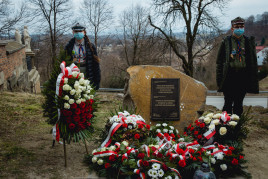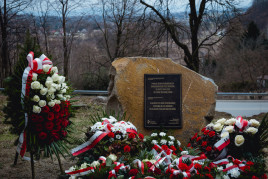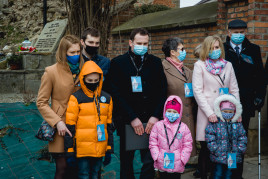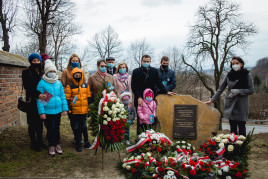A commemoration of Józef Pruchniewicz - Instytut Pileckiego
A commemoration of Józef Pruchniewicz
On 23 March, we honored a resident of Biecz who was murdered for helping Jews during the German occupation. The 16th commemoration as part of the “Called by Name” project was closed to the wider public due to the pandemic.
Józef and Maria Pruchniewicz ran a farm on the outskirts of Biecz. They had two daughters, Jadwiga and Helena. Józef worked as a cart driver and was often employed by Jewish merchants. In this way he met the Blum family, who ran a mercery in the town square of Biecz.
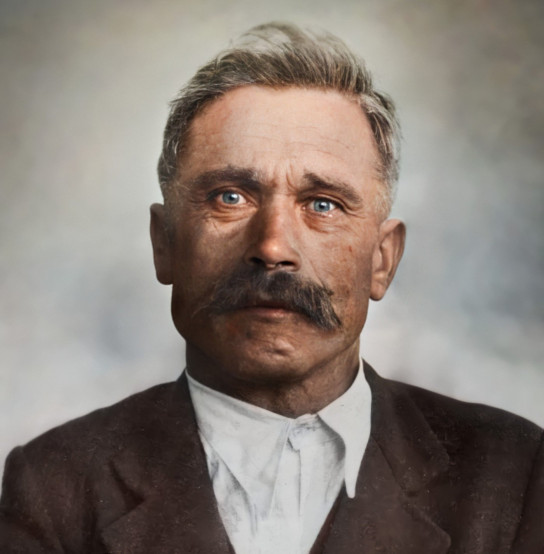
When the Germans began the liquidation of the town’s ghetto on the morning of 14 August 1942, a few Jews managed to hide and thus avoid certain death at the extermination camp in Bełżec. Among those who escaped were members of the Blum family: Trana, Jehuda Leib, their daughter Reizel and their nephew, Mosze Kuflik, who lived with them at the time. The family asked Józef Pruchniewicz for help. The farmer decided to hide the Jews at the attic of his barn, even though he knew that he could be punished with death. Pruchniewicz’s decision was all the more daring as the farm abutted onto a rail bridge that was patrolled by the German railway police.
The Pruchniewicz family hid and fed the Jews for 16 months. In November 1943, fearing denunciation, Józef Pruchniewicz decided to send the Blums away. They found shelter at the Dylągs’ farm in nearby Strzeszyn.
Pruchniewicz’s concerns proved to be justified. On the morning of 14 March 1944, German policemen arrived at his house. Józef was brutally interrogated by the Gestapo men in front of his wife and 10-year-old daughter Helena, but he didn’t confess to hiding Jews. When the terrified girl began to cry loudly, the Germans ceased to beat her father, searched the premises and took Józef to the Gestapo station in Jasło. He was probably shot and buried at an execution site in the woods surrounding nearby Warzyce. Mosze Kuflik, Jehuda Leib Blum and his daughter Reizel survived the war and moved to Israel.
For many years, Mosze Kuflik would think back to the nightmare of constant fear for his life, which he had had to endure for almost a year and a half. Nevertheless, his traumatic memories were intertwined with immense gratitude towards the Pruchniewicz family. As an elderly man, Mosze decided to come to Poland and find the people who remembered those fateful events. Jadwiga Wędrychowicz, the great-granddaughter of Józef Pruchniewicz, thus recalled his visit: “When my generation was growing up, we started asking questions about our ancestors. Unfortunately, our grandmother Jadwiga had already passed away, and the only eyewitness to those events, our beloved aunt Helena, kept it all secret for a very long time. When she decided to share her story in the 1990s, it turned out that her knowledge was limited. It all changed when Mosze Kuflik, a Survivor from Biecz who had been hiding with our family, arrived at our house. He told us about the role played by our great-grandparents and grandmother Jadwiga in the saving of a Jewish family. From that moment on, we took a more decided interest in our own history […]. Thanks to the help of kind people and the wonderful initiative of the Pilecki Institute, the ‘Called by Name’ project, we can participate in this very important event”.
The Pilecki Institute honored Józef Pruchniewicz on 23 March 2021, on the eve of the National Day for the Remembrance of Poles who Rescued Jews under the German Occupation, and on the second anniversary of the project’s inauguration in Sadowne (read more). The commemoration was co-organized by the Ministry of Culture and National Heritage, the Gorlice County Office and the Mayor of Biecz. The ceremony began with a mass at the Collegiate Church of Corpus Christi in Biecz, celebrated by Bishop Jan Wątroba and the parish priest Rev. Janusz Kurasz.
After the liturgy, a stone with a commemorative plaque devoted to Józef Pruchniewicz was unveiled, though sadly the event could only be attended by a limited number of people (due to the pandemic). Prof. Magdalena Gawin, the Deputy Minister of Culture and National Heritage and the initiator of the “Called by Name” project, observed: “Józef Pruchniewicz was awarded with the Righteous Among the Nations medal because the Jews who had survived thanks to his help wanted to honor his memory. This is a unique case, as the majority of those people [Poles murdered for helping Jews] never received a Yad Vashem medal. What we should be most concerned about is that the memory about those people be kept alive in Poland; they should be held in the greatest respect […]. This commemoration is just a beginning to what should follow.”
The “Called by Name” project is devoted to the memory of Polish nationals who were murdered for helping Jews during the German occupation. The name of the project is a reference to a poem by Zbigniew Herbert, Mr. Cogito on the Need for Precision, in which the poet appeals for a precise counting of the victims of the “fight against inhuman power”. The Pilecki Institute inaugurated the project on 24 March 2019, the National Day for the Remembrance of Poles who Rescued Jews under the German Occupation, in Sadowne.
The “Called by Name” project, initiated by Prof. Magdalena Gawin, the Deputy Minister of Culture and National Heritage, and carried out by the Pilecki Institute, was created out of the need to mark sites in the public space connected with the murdered victims. The Pilecki Institute strives to make these local experiences part of the universal historical awareness. You can learn more about the idea behind the “Called by Name” project and its significance not only for the families of the commemorated, but also for the local communities and the entire society, from the speech delivered by Prof. Magdalena Gawin on the National Day for the Remembrance of Poles who Rescued Jews under the German Occupation.
